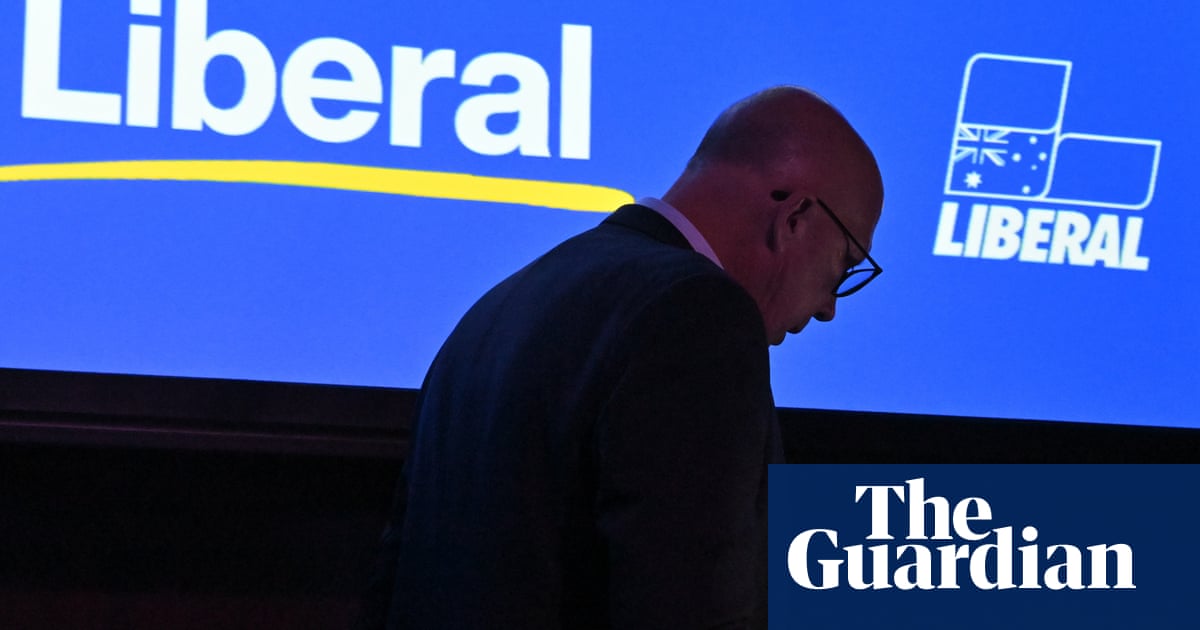Senior Liberals are warning that the party must urgently reconnect with traditional supporters, women and younger Australians if it is to find a pathway back to relevance, describing John Howard’s broad church as “broken” afterSaturday’s election drubbing.
As remaining MPs and party strategists begin to consider thescale of the lossunder the outgoing opposition leader, Peter Dutton, most agree that a major policy and messaging reset is needed to return the party to its roots under its founder, Robert Menzies. But, in a sign of the fight to come, some leading Liberal figures are pushing for a move to the right, arguing that the party has not been conservative enough.
The senior moderate and former finance ministerSimon Birminghamsaid on Sunday that the melding of liberal and conservative thinking within the party had been lost.
“TheLiberal partyhas failed to learn lessons from the past and if it fails to do so in the face of this result then its future viability to govern will be questioned,” he said.
Birmingham used a lengthy reflection on the result to call for quotas for women in party preselection, saying they should be “hard, fast and ambitious”. Liberals have resisted quotas for decades, while Labor has reached gender parity in its caucus since implementing them in 1994.
“The Liberal party is not seen as remotely liberal and the brand of conservatism projected is clearly perceived as too harsh and out of touch,” Birmingham said.
“A Liberal party fit for the future will need to reconnect with and represent liberal ideology, belief and thinking in a new and modern context.”
Sign up for the Afternoon Update: Election 2025 email newsletter
Early discussions about the leadership took place in private on Sunday, even as a slew of seats remained too close to call. Most MPs contacted by Guardian Australia agreed that a root-and-branch policy review was needed, with some pointing to Dutton’s plan for nuclear power and divisive rhetoric on Indigenous welcome to country ceremonies.
The New South Wales senator Dave Sharma said the Liberals had suffered a devastating loss due to a failure of strategy and campaign management.
“It is clear we failed to convince the public that we would be a better government, even if they had misgivings about Labor,” he said.
“A loss of this magnitude demands a serious set of reflections, reviews, and internal conversations about our policies and direction. That will take some time.
“The nation is best served by a strong opposition. We need to ensure the Liberals can provide this.”
Internal party polling put the Liberals ahead in a series of Labor-held seats in the final days of the campaign, including Werriwa, Whitlam and Gilmore in NSW. The results gave false hope to the Dutton camp, even as published pollsshowed Labor on track to win.
Some party figures blamed key strategists in the campaign, including the former minister turned Dutton adviser Jamie Briggs. Some Liberals said Dutton’s efforts to promote party unity after the Coalition’s 2022 election loss meant not enough policy fights had taken place.
Others said the Coalition had drawn the wrong lessons from the no vote in the voice to parliament referendum, believing it was a sign of a rightwards shift in the electorate.
The Liberal grandee and former Howard government minister Philip Ruddock said party MPs elected on Saturday were responsible for charting a course back to power.
“My father said the Liberal party always knows how to bake a bigger cake, and the Labor party only know how to cut it up,” he said.
“If you’re looking at the way forward, you need to be very focused on how you’re going to create wealth and opportunities. The Liberal party of the future has to be very focused on building a bigger economy, creating the opportunities, and then later deciding on how you might better apportion the gains.”
Sign up toAfternoon Update: Election 2025
Our Australian afternoon update breaks down the key election campaign stories of the day, telling you what’s happening and why it matters
after newsletter promotion
MPs said more checks and balances were needed to the new party leader’s authority.
“We lost the trust of metropolitan voters and need to urgently work out how to get it back again,” said one MP, who was narrowly re-elected.
The re-elected NSW moderate Andrew Bragg said Australia was “drifting” under Labor. “It was the toughest night for the Liberals ever,” he said.
“The message from the electorate is clear. For the Liberal party, the road back starts with a deeper understanding of modern Australia.
“We must offer an ambitious economic agenda and a centrist, inclusive social vision. Reclaiming enterprise and the centre is not a departure from our values – it is a return to them.”
The former senator and party strategistArthur Sinodinos said the Liberals needed to return to first principlesand rebuild Howard’s broad church.
“Grievance politics was not enough to win,” he wrote in an opinion piece for Guardian Australia. “An opposition must have a clear and coherent plan that demonstrates they are ready to govern.
“Listening to our fellow Australians, grappling with the complexity of demographic and social change in a way consistent with Menzian values will succeed if we do the hard work.”
The former deputy prime minister and Nationals frontbencherBarnaby Joycedeclined to say who should lead the Liberals. While the junior Coalition partner will have a stronger presence in the joint party room due to fewer Liberals winning their seats, Joyce said there was little room for celebration.
“It is a wake-up call. There is no winner in our loss but you can’t turn yourself into another party. You have to do what you’re meant to do better.”
The rightwing South Australian Liberal Alex Antic blamed policies which did not resonate with voters. “Unfortunately, we’ve sent the troops into battle without ammunition,” he said.
Antic told Sky it was time to “make the Liberal party great again”, echoing Trump’s campaign slogan.
